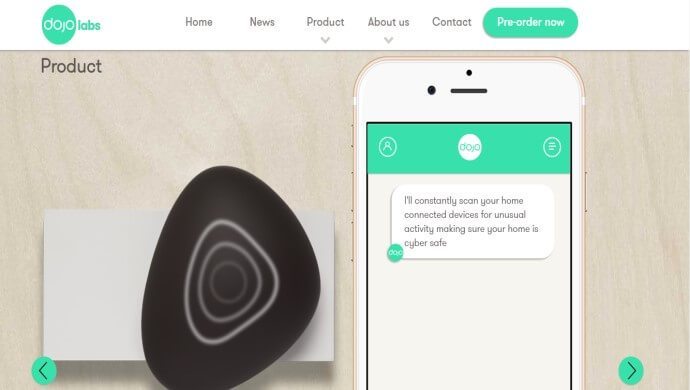It is helpful to understand why people should care if someone hacks their coffee maker

Less than a year after emerging from stealth, it was reported today that Dojo-Labs has been scooped up by the British anti-virus company BullGuard.
While the company has stated that the founders CEO Yossi Atias and CTO Shmulik Bachar will be sticking around following the acquisition, other details pertaining to the price and terms of the sale have not been released at this point.
Their device, which had not yet made it to market due to reported delays – like many in the hardware game – is said to help protect smart home owners with their mass of connected devices. Shaped like a smooth rock, the device monitors network traffic in the home, watching for suspicious behaviour that could signal malfeasance from attackers.
Dojo-Labs’ device comes with an accompanying mobile app that serves as the user interface, alerting the owner of any incidents that could arise.
Originally listed at US$99 for the device, it is unclear how the acquisition will affect the price of the device itself, if at all, as well as the service package for the protection.
Also Read: Japan comes looking for Israeli cyber security startups
The Wild West of IoT security
Concern over IoT security has been growing over the past few years, helping to cool down the excitement for the homes of the future.
After the initial craze of how wonderful it will be to have “smart” locks, coffee machines, health monitors, and a variety of other automated devices, the industry and more importantly the public began to think about the security angle of connecting different aspects of our homes with the internet.
Just as a laptop or phone is hackable, the tiny computers inside of IoT devices can be breached and exploited by hackers. Add to this the explosion of the exploit kit markets that sell prepackaged attacks for low prices, and any malicious actor can easily start causing harm to unsuspecting users.
So as viruses have been around for some time now, the industry has responded with anti-virus products and other methods of lowering the risk and damage from attacks. IoT poses a different challenge for a number of reasons that make it harder to secure. First is that the number of manufacturers of PCs and phones is relatively limited, and these companies are aware of the potential threats to their devices. All of a sudden when the other industries that have never had to think about digital security open up new attack vectors, then the base groundwork for protection is sorely lacking.
Also Read: HARMAN acquires Israeli cyber security startup TowerSec for US$75M
Why should people care if someone hacks their coffee maker?
Fair question. Let’s take a look at some of the possibilities.
Hackers rarely go in the front door where security is strongest. They will look for less guarded entrances that are in the same network, breaching and moving until they reach their target. There is also the issue of an otherwise innocuous device being taken over by hackers, being turned into a “zombie” to take part in a DDoS attack. They can also make the jump from a smart device to your laptop or phone where much more valuable data is stored.
So while the damage to your coffee maker may appear minimal, going from burning your coffee to burning your house down, the stakes could go up if someone takes over your thermostat, locks you in your house, or is able to cross over to your car and affect the operations of your breaks. The opportunity for ransomware-esque attacks are endless.
Speaking with members of the VC and cyber security communities, they have told Geektime that they are cautious about the pace of IoT’s real integration into the market until security is addressed more fully.
One of the challenges is that while a person or family is likely to have only a few computers and phones/tablets, the smart home and wearables are likely to grow the number of devices exponentially. Figuring out how to protect the communication of all of these devices is an open question.
Thankfully the public seems hungry for solutions, with home networking monitoring models looking pretty popular. Dojo-Labs competitor Cujo succeeded in raising US$327,453 in their Indiegogo campaign back in November, reaching 763 per cent of their requested funding.
Only time will tell whether the market will go with these devices like Dojo-Labs and Cujo, or look to built-in solutions for the routers. Companies such as Secret Double Octopus have solutions that rely on a completely different approach.
By the time Dojo-Labs and their new partners at BullGuard are ready to release their product to the market, the options available for stronger security in the IoT ecosystem will hopefully have continued to evolve.
—
The article Israeli IoT security hardware startup Dojo-Labs bought by UK’s BullGuard first appeared on Geektime.
The post Israeli IoT security hardware startup Dojo-Labs bought by UK’s BullGuard appeared first on e27.